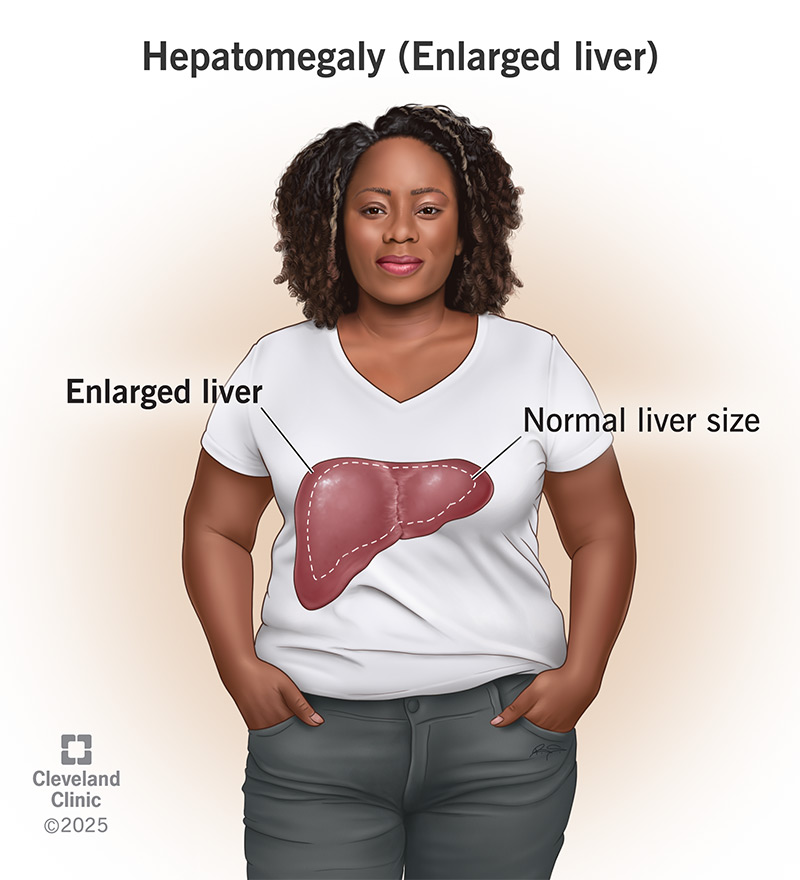An enlarged liver is a symptom of underlying disease. It means that your liver is larger than normal. This may happen in response to an infection, advanced liver disease or cancer. Healthcare providers treat an enlarged liver by treating what’s causing it.
Advertisement
Cleveland Clinic is a non-profit academic medical center. Advertising on our site helps support our mission. We do not endorse non-Cleveland Clinic products or services. Policy

Image content: This image is available to view online.
View image online (https://my.clevelandclinic.org/-/scassets/Images/org/health/articles/17937-hepatomegaly-enlarged-liver.jpg)
If you have an enlarged liver (hepatomegaly), your liver is swollen beyond its normal size. This is most often a symptom of another problem like liver disease. But sometimes, it’s a disease in your blood or heart.
Advertisement
Cleveland Clinic is a non-profit academic medical center. Advertising on our site helps support our mission. We do not endorse non-Cleveland Clinic products or services. Policy
Your liver is one of your essential organs — one you can’t live without. It performs many important bodily functions, including filtering toxins from your blood and regulating your blood cholesterol. A healthy liver can perform all these functions, but an enlarged liver can’t. No matter the cause, you and your healthcare provider will need to find it and treat it to preserve your liver function.
You should take it seriously, but the exact seriousness depends on the cause. An enlarged liver could be an emergency or a warning. There’s no way to know until your healthcare provider does some investigating. Sometimes, your liver swells in response to a short-term condition, then goes back to normal. Other times, a long-term condition is causing slow but progressive damage.
You likely won’t notice an enlarged liver on your own. In some severe cases, you might notice a feeling of bloating or fullness in your belly or an ache in your upper right abdomen (where your liver is). It’s more likely your healthcare provider will discover it during an exam. They might notice that your liver feels different from what it should when they touch your belly.
If a swollen liver is a sign of liver disease, it might come with other related symptoms, such as:
Advertisement
Your liver could be swollen or enlarged by:
Common causes include:
Less common causes of hepatomegaly include:
Systemic cancers
Bile duct diseases and strictures
Heart and vascular causes (congestive hepatopathy)
Your healthcare provider will work with you to determine the cause. They may take blood tests and imaging tests to look for evidence of various diseases. If your condition appears severe, they may want to take a liver biopsy to test a sample of your liver tissue in a lab. They’ll offer treatment options based on the results of these tests.
There isn’t a medication to treat an enlarged liver. Rather, there are medications that can treat certain conditions that cause an enlarged liver.
Sometimes. Your liver has a remarkable ability to repair itself when there’s enough healthy tissue left. If your enlarged liver happens suddenly, treating the condition will allow your liver to heal.
If it’s the result of chronic (long-term) liver disease, it can potentially be reversed and, in some cases, cured with lifestyle changes.
For example:
Advertisement
If the upper right side of your belly feels swollen or sore for any reason, make sure to have it checked out. Call your healthcare provider right away if you have other strange or severe symptoms, such as:
An enlarged liver is a symptom of many diseases. Not all are emergencies, but they’re all deserving of medical attention. If your healthcare provider notices that your liver is swollen or enlarged, they’ll want to know why. It usually involves inflammation and liver disease, but sometimes, it’s something unexpected.
If you’ve already been diagnosed with progressive liver disease, hepatomegaly could be a sign that the disease is progressing. If you’ve never had your liver looked at before, this might be your first hint of a problem. Either way, follow your healthcare provider’s recommendations for testing and treatment.
Advertisement

Sign up for our Health Essentials emails for expert guidance on nutrition, fitness, sleep, skin care and more.
Learn more about the Health Library and our editorial process.
Cleveland Clinic’s health articles are based on evidence-backed information and review by medical professionals to ensure accuracy, reliability and up-to-date clinical standards.
Cleveland Clinic’s health articles are based on evidence-backed information and review by medical professionals to ensure accuracy, reliability and up-to-date clinical standards.
If you have a disease that’s affecting your liver, you want expert advice and care. At Cleveland Clinic, we’ll create a treatment plan that’s right for you.
